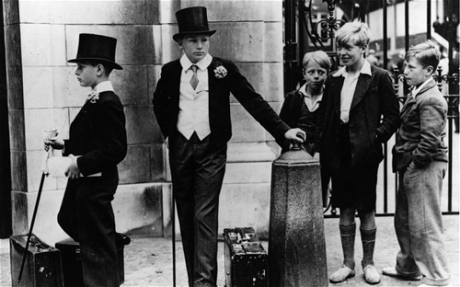
I’ve just been alerted to an interesting article in Psychology Today by Michael Bader (a psychologist from San Francisco), hypothesizing that right-wing attitudes to health care reform may come from a deep-seated fear of dependency. There’s some interesting ideas in here, whether you agree with him or not, it certainly gets you thinking. Often people cite the pursuit of freedom as their primary reason for being against Government-run healthcare. But surely this is irrational? If you are desperately sick and can’t afford to pay to see a doctor you are far from ‘free’ in any sense. In these type of cases Obamacare would increase the level of people’s freedoms. Why are people opposing policy that will ultimately benefit them? Is it that they don’t want to accept a societal responsibility to help others who can’t help themselves? Surely freedom and responsibility are two sides of the same coin, and one without the other is an illusion? Bader tries to plumb the deep psychological depths of these questions and comes up with some interesting suggestions.
Read it here

Are Right Wingers Scared of Dependency?
owen jones, cringing in the shadow of margaret thatcher
^^^
I’m usually a fan of Owen Jones’ work. I thought ‘Chavs’ was a good book that said some important things that had gone very much un-said in recent times, where even supposed ‘lefties’ started bashing the lowest echelons of our increasingly stratified society. This post from the Commune raises some good points about his views and positioning however; I can’t help but agree with the author that his misplaced faith in New New (One Nation) Labour will lead a lot of his followers and fans to disappointment.
Why the VICE generation are apocalyptic and frightened
Vice Magazine’s Alex Miller interviews one of Red Eye’s favourite filmmakers, Adam Curtis, in this new piece called Looking Beneath the Waves. In the article Curtis shares some of his latest theories on why the news (in its current guise) is unable to shed any light on the real reasons for the global financial meltdown, why economics is a failed pseudo-science, why a whole generation has grown up to be supremely cynical and paranoid, and the frightening reality of a world in which no-one really knows what’s happening, including both the journalists and politicians that pretend to have all the answers.
The Problem With Science
New documentary film by Michael Coldwell on philosopher Jim Schofield’s latest theories. Science has made several crucial assumptions that are fundamentally flawed, and may have skewed our view of the world around us.
Music is supplied by our friends in the Urban Exploration collective 🙂
Clay and the Collective Body
Just read a really interesting interview with sculptor Antony Gormley (in New Scientist magazine, of all places) that had a surprisingly political slant.
His recent installation Clay and the Collective Body explores “conversations between people – through objects or through the process of creating” by locking 100 random people in a stark white environment, with only a monolithic block of clay for entertainment. This “gave rise to an extraordinary and explosive outpouring of, you could say, collective unconciousness.”
This alien place seemed to trigger something in the participants, something primal that if I was more of a “yogurt-weaver”, I may be tempted to call a universal human connection – certainly the only familiar sight were other people, and the only way of killing time was to create.
“What’s absolutely beautiful is the way that people have occupied that space and become the absolute opposite of what capitalism wants us to be – passive consumers of spectacle, of information, of entertainment, of objects of desire – they become participatory and productive and cross-fertilising.” I thought it was particularly apt that Gormley chose to use the word occupy in that context.
Although Gormley goes on to state that he never intends to make overt political statements with his work, he lets slip that “…there’s no question that many of my works, in different ways, are asking about the connection between humans and our environment. And I think that all my installations in cities of the naked human animal in effigy form – surrogate fossils, industrialised fossils – are asking, where does humankind fit? Now that we seem to be well into the sixth great extinction, how long are we going to contribute to the evolution of life? Those are very big issues” – and undoubtedly political ones.
Another subject that Gormley brings up in the interview, that is also a favourite of my own, is that of Easter Island.
This ‘ghost island’ captured my imagination from a very young age, as it seems to encapsulate the power that art and iconography can hold over people, our self-destructive tendencies, the damage that can be caused by a flawed belief system and the folly of excess that human civilization seems prone to follow.
“What was in the mind of the man or woman on Rapa Nui who cut down the last tree? It seems the answer to that question is “Well, I cut down this tree because that was what my father did and that was what my father’s father did.” I think we’re in the same position, but we are running on the myth of progress. My work is there to ask pretty serious questions about how we can shift our perception of what constitutes viable human actions or viable human behaviour.”
I always thought there was an eerie connection between Gormley’s sculpture and the statues on Easter Island, and I’m pleased to learn my instincts were close to the mark. Both signify mankind’s strange detachment from the world that bore him, and the lonely marks left on the land after he has gone.
Gormley also goes on to criticise elitism and the determinism of scientific progress – it is a thoroughly thought provoking and enlightened article, that has once again piqued my enthusiasm for art’s potential to induce change, by making us take a long, hard, look in the collective mirror.
Read the whole interview in New Scientist
How do the Tories get away with it?

Nice bit in The Independent by Owen Jones on the working class and how Tories win elections.
“Just how do the Tories get away with it? Since they were founded as a modern political force in 1834, the Conservatives have acted as the parliamentary wing of the wealthy elite. When I was at university, a one-time very senior Tory figure put it succinctly at an off-the-record gathering: the Conservative Party, he explained, was a “coalition of privileged interests. Its main purpose is to defend that privilege. And the way it wins elections is by giving just enough to just enough other people”.”
Why Socialism VII: How are Decisions Made Within Capitalist Democracy

Read the latest instalment of Jim Schofield’s series on the Shape Blog.
NHS Carve-up… the Spending of Public Money. A Couple of Well-Worded Links!

This succinct map and the article that goes with it is to be found on this blog, a terrifying indication of the rapid onset of privatisation of our NHS… important if very depressing information…
I thought I would include this guy too- expresses his anger at the spending of public money better then I could muster without quite blowing a fuse…
Don’t get sucked in to Kony 2012

“KONY 2012 is a cleverly orchestrated campaign specifically aimed at today’s youth, the future citizens of the world. Using state-of-the-art techniques and new technologies, the campaign is a first attempt at “reverse propaganda”, where the agenda APPEARS to emanate from the people. By using emotions, irrational thoughts and superficial explanations, KONY 2012 attempts to trick well-meaning people, who desire to make a positive change in the world, to instead fuel a gigantic war machine that is controlled by the world’s elite.
Is KONY 2012 trying to eradicate child-soldiers or is it attempting to create a new kind of child-soldiers?”
Ben Keesey defends Invisible Children
Critical article from Alternet
Why are The Telegraph and The Sun pseudo-defending it (Right Wing Press) and the Left and Liberal media are suspicious?
Why are there so many seemingly subliminal style edits in the film, and cryptic iconography?
Why is the TRI logo an INVERTED peace sign, similar to the Yggdrasil ‘tree of life’ rune used by right-wing extremists?

The above image is a shot from the Kony 2012 film – it is shown for less than a second…
Too many oddities and unanswered questions for me. Not solid evidence I know but I do not trust the people behind this, there is definitely a hidden agenda of some sort.
It’s the weird manipulative cultish overtones and glossy american christian-ness that sent my own alarm bells ringing – but yeah, don’t take this at face value anyway, do some background reading and make up your own mind.
Just a heads-up.
Generation OS13
For a new era, generation OS13, the repression will not be tolerated; do the government really think they can win that war if the young people are like fuck this, you cant beat that you, can’t beat us, it’s Impossible – Saul Williams
Slightly flawed but welcome documentary from someone ‘Anonymous’
Give it a watch, keep your eyes open <o>
Black March is coming…
I’m a musician and DJ, I help to run a record label and have been involved in running live music events, promoting independent music and writing about it online for many years – I love music and the people that make it, but I don’t have much love for the music ‘industry’. Like most big business entertainment, the music biz leeches off the hard working and the talented, makes huge profits and routinely fucks over both the artist and the consumer.
Have a look at this link if you are still in any doubt about who this parasitic behemoth really benefits. It aint the musician.
These are the people that are lobbying governments worldwide to monitor online content, censor and remove websites they don’t like, and they support the introduction of draconian litigation such as the now infamous SOPA, PIPA and PCIPA bills, to defend their industry.
While I completely support the musician’s right to earn a living from their craft, clamping down on internet freedom is not the way to defend it. A free internet is vital for a free world. If governments and corporations have increased powers over internet content that freedom is threatened. The web is the most powerful tool we have for self-expression, inducing social change and for the dissemination of great art and music. We cannot allow these people to take that away from us.
This is why I support the Black March campaign.
From the 1st of March 2012 to the 31st, we ask you not to buy any music, DVDs, computer games or books – don’t even torrent a song! Wait till the 1st of April and buy it then. No one will actually lose any money, but the visible dent in their profit margins for the first quarter will send a powerful message to the corporations and organisations that wish to push these online censorship measures. We can stop this going through. Wikipedia and others going dark last month, and the attacks by Anonymous have already made policy makers hesitate. If music consumers join the fray, they will have another powerful enemy. Vote with your wallet and support Black March – boycott the music industry next month.
Some of my friends have expressed concerns that this campaign will somehow hurt small labels and record stores, who of course have nothing to do with lobbying for increased control of internet content. My answer to this dilemma is very straightforward. Buy the music you would have bought in March now. And spend more again in April. Of course you should support the small businesses and record labels you respect. This isn’t about them. This about sending a message to the industry as a whole, the big distributors, the fat cats and to governments around the world. We will not tolerate internet censorship in any form.
If you care about online freedom, please get involved in this campaign. If you wish to see a fairer music industry, buy music directly from the artists and from small record shops. Fuck Universal. Fuck Disney. Fuck News Corporation. Fuck Sony Music Entertainment. Support freedom and creativity.
Sorry for the rant peeps! If you’ve read this far I salute you. Peace out.
Reflections on another Black Mirror
The second installment of Charlie Brooker’s Black Mirror leads us to another implausibly grim vision of the future, but the main difference between The National Anthem and 15 Million Credits, is that the latter is actually rather good.
Co-written by Kanak ‘Konnie’ Huq (of Blue Peter fame) and directed by Euros Lyn (Doctor Who), this modern fable is a surprisingly entertaining glimpse at a possible future dystopia. We can only guess that what unfolds is society’s answer to the impending energy crisis, as people are put to work on millions of exercise bikes to fuel a hi-tech, computerised existence, obsessed with mindless entertainment and online living – distractions from their slavery.
The plot is much more emotive and engaging than the first episode, with characters you actually care about and everything – and it does what all great satire should do, which is to push the current way of things to the extreme, in order to reveal some hidden truths about their nature.
It’s also really heartening to see some proper Science Fiction back on the television. The best Sci-Fi uses the future to tell us about the present, and 15 Million Credits does this better than most. Its exploration of the cruelty innate within Reality TV shows like The X Factor is undertaken by pushing them further in that direction. Its subversion of the idea that social networks somehow bring us closer together, its parody of throwaway digital culture, web advertising and online pornography and its use of a Microsoft Points-style credit system in place of a currency – all have deep sociological and psychological resonances with the new ways we have begun to live our lives through technology.
Black Mirror’s dark future is like our own world with the volume turned up, and what is reflected back is not a pretty picture. Most worrying of all is how the technology is used to placate us, used to make the population do the bidding of the powers-that-be, by removing people’s freedom of choice and disempowering them, while making them believe they are actually getting exactly what they want. In full high definition. Just keep peddling and saving up those credits and all your dreams will come true, citizen. It’s the same lie we’ve always been told, and the black mirror of the ubiquitous LCD screen reflects both that, and a ghostly wan imitation of our vitamin D-deprived faces. Now plug in, shut up and resume viewing.
This is a very clever caricature of our increasingly digital world, the full consequences of which, we are still oblivious to. Let’s just hope Brooker and Huq’s vision of a malevolent force behind the network is just another dark fantasy and not a true sign of things to come.
Can’t wait for next one now…
Watch On 4OD
The Trap
If you have not yet seen Adam Curtis’s 2007 documentary series The Trap now is your chance. All three episodes are included in full, below.
Here Curtis explores what we mean when we talk about Freedom, the ideas of negative and positive liberty, and the strange dichotomy between coercion and it’s apparent opposite.
It’s really interesting stuff whatever political side of the fence you prefer. The concept of freedom lies at the heart of many political ideologies, from the Neoconservatives and the Bush Administration to Anarcho-Communists to New Labour – what differs is how freedom is conceptualised and administered, who that freedom really benefits and what it is actually liberating us from…




























